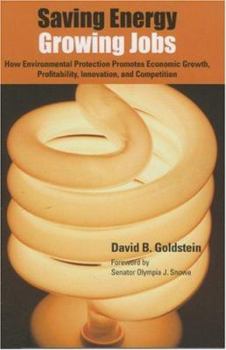Saving Energy, Growing Jobs: How Environmental Protection Promotes Economic Growth, Profitability, Innovation, and Competition
The idea that we must choose between a healthy environment and a healthy economy is a myth, says David Goldstein. Not only do well-conceived environmental regulations create more jobs, in the long run they contribute to more efficient designs and less expensive products. Standing between us and a cleaner, more prosperous society is the resistance of economic incumbents and a misplaced ideological opposition to any kind of regulation, even though it...
Format:Paperback
Language:English
ISBN:0972002162
ISBN13:9780972002165
Release Date:January 2007
Publisher:Bay Tree Publishing
Length:336 Pages
Weight:1.15 lbs.
Dimensions:0.9" x 6.1" x 9.0"
Customer Reviews
3 ratings
Back to the Future
Published by Thriftbooks.com User , 17 years ago
This book has been written in 2007. At the time, it was a vision. Today, this is reallity! I liked Mr. Goldstein's point of view. He brings new ideas and this gentleman knows a lot about both sides of the story: Business and Environment. If you are looking for good tools to help you in a industry/environment discussion, here you are. This is a very good book if you would like to understand the World of Energy and how to bring solutions to some problems with facts. I highly recommend it
Groundbreaking Study of Efficiency Should Be More Efficient
Published by Thriftbooks.com User , 17 years ago
This is a very frustrating book. David Goldstein gets high marks for his groundbreaking ideas on energy efficiency, but he damages his insights with atrocious writing and research methods. First for the good news. Goldstein bridges the gaps between environmentalists and business interests by ruthlessly debunking the myths that keep both sides from talking to the other. These myths prevent not just understanding, but policies that can both protect the environment and enhance profits. All sides could win if it wasn't for their political ideologies and misperceptions of the other's motivations. Goldstein also illuminates the weaknesses of fundamental economic theory, politicized beliefs in free markets, and opposition to government regulations. Energy efficiency technologies and incentives can clearly bridge these political chasms. Now for the bad news. The structure and style of this book indicate that Goldstein can't decide who is audience is. Most of the text is addressed to environmentalists and business leaders, but in the introduction Goldstein for some reason tries to please a limited academic audience by claiming that professorial literature on his subject matter is prohibitively scarce. Not only does this alienate 99% of Goldstein's audience, but it's also an insincere apology because there has been plenty of academic research on most of the topics here. It's just outside of economics, the discipline that Goldstein almost exclusively cites (and criticizes). For instance, political economy and critical legal studies are loaded with research on the weaknesses and failures of classical economic theory, but none of it is acknowledged by Goldstein in his misguided attempts to build his own theory. This fractured research focus holds back the full potential of Goldstein's ideas, and prevents him from taking a stand behind his otherwise groundbreaking ideas. And finally, there is the problematic writing. Goldstein needs an editor to help him stop trying to impress professors and to write for his real audience. The book is slowed down by inelegant, crusty language like "strong theoretical reasons exist to expect the result." And Goldstein severely overuses introductions and summaries (another academic bad habit) to an extent that is downright annoying. Every single chapter starts with several paragraphs on what will be discussed, and ends with several paragraphs that summarize what was discussed and introduce the next chapter that also has its own introduction. Each of the book's three parts has a multi-page introduction that repeats the introductions for each of the chapters, and the final chapter and appendix spend 41 pages largely summarizing the rest of the book. Worst of all are the preface AND introduction which spend 21 pages doing you-know what. This is extremely tiresome for the motivated and interested layperson. By eliminating all of this book's introductions and summaries, it could be much more efficient in size, and in the energy req
An enthusiastically recommended addition to personal, professional supplemental reading lists
Published by Thriftbooks.com User , 17 years ago
The documented theme of David B. Goldstein's "Saving Energy, Growing Jobs: How Environmental Protection Promotes Economic Growth, Competition, Profitability And Innovation" is that those who maintain that the public the government, and the business community, must choose between a healthy environment and a healthy economy is a false choice. Goldstein persuasively presents the view that well-conceived local, state, and federal environmental regulations will create more jobs in the local, state, and federal economies than they will eliminate. An additional benefit is that sound environmental policies will effectively spur the creation of more efficient designs and less expensive products by the regulated industries. "Saving Energy, Growing Jobs" profiles the unexpected success of early energy regulations; reveals how markets actually work and how they fail; exposes the myths of both the environmentalists and the anti-environmentalists; provides a practical model for well-designed environmental policies; and offers guidelines for transforming the current national political debate with respect to environmental regulation to deal with everything from climate change, to pollution controls, to joint international efforts for environmental protections. Of special note are Goldstein's proposals for implementing a combination of incentives and regulations to speed the process of developing sound and effective environmental policies and practices. "Saving Energy, Growing Jobs" is an enthusiastically recommended addition to personal, professional supplemental reading lists, as well as corporate, governmental, academic, and community library Environmental Studies and Economic Studies reference collections.






